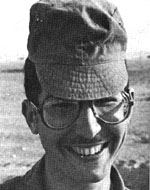Son of Aryeh and Clara. He was born on September 25, 1958 in Givatayim. He studied at the Berl Katznelson Elementary School and continued his studies at the David Kalai High School in a real-life program. The youngest son of his parents, a fourth child and a brother to three sisters, his parents (both) perished in the Holocaust. Jacob bore the name of his grandfather on his father’s side. Even in early childhood, he stood out for his kindness and his love for others. A child who hated injustice and only good was in front of his eyes. His love for order and cleanliness was also a good thing. This feature was deeply ingrained in his personality and aroused admiration from all of them. Yes, he loved sports and even reached the desired status – number one in his class and number two in school. His stubbornness and perseverance were evident in his studies, which, like any other field he had dealt with, showed seriousness and seriousness. Jacob liked to sing and play. First on the violin and then on the guitar. A very sociable boy and loved by everyone-children, friends, adults. Jacob liked to photograph. Perhaps in this hobby it was an expression of his love of people, for he particularly liked to perpetuate his camera. In the pictures, which came out of the same simple camera of Jacob, there would be real human figures, as he must have seen them. He was a member of the Hanoar Haoved Vehalomed movement. Here, too, his virtues – virtues, loyalty to a friend, integrity, devotion to purpose, thoroughness, rootedness, and, above all, his love of man. His greatest dream was peace. He wanted him with every fiber of his soul and clung to every letter and sign that he thought was a harbinger of the hoped-for peace. He believed that peace with Egypt was not a dream. “Egypt is also hurting the war.” Said after the War of Attrition. They too suffer. And his sensitivity to the suffering of people was not confined to his own people. A man is a man, he said, and whatever his origin, race, and status will be. Once he had walked the old city, it was when everyone was still proud of victory, amazed at the unification of the city. But Jacob’s Lev was in the hands of children wandering the alleys. He saw them in poverty and in their Lev and filled with compassion. He felt the pain of the humiliated person. However, he began to prepare for the induction in the 11th grade, and he worked hard to improve his physical fitness and decided to join the “Shdemot” nucleus and went to Shalhat early in Alumot. Jacob quickly integrated into the crystallized society of the nucleus. And because of his sense of order and his developed justice, he was soon appointed to the Labor Party. At the beginning of January 1977, Yaakov was drafted into the IDF, and after completing basic training he underwent courses in infantry and armored corps, and became a combat soldier, infantry and tank driver. In the heat of Sinai, the love of order and cleanliness and meticulous attention to every detail was also a good thing for his friends and commanders, and at the end of his service in Sinai, he returned to Kibbutz Alumot for the middle term. On the 7th of Shevat 5739 (February 7, 1979), Jacob fell in the line of duty, was brought to eternal rest in the military cemetery in Kiryat Shaul, and left behind his parents and three sisters: “Yankele was a simple, pleasant man who kept his honesty and integrity.” The unit commander wrote in a letter of condolence to the bereaved family: “He was innocent and fulfilled his duty with efficiency and dedication.” “It was not for nothing that Ya’akov was described in the pamphlet as a benevolent benefactor,” his comrades wrote in the pamphlet. In Kibbutz Alumot, where Yaakov served as a member of the Nahal Brigade, a monument was erected in his memory where he fell, and the kibbutz clinic was named for him. In the study room of the Berl Katznelson School, a literature and language section is named after him, and a guided reading, including a eulogy, memoirs and wordsAn evaluation by his parents and his classmates, the army and the Nahal Brigade, was published by Aleph.
